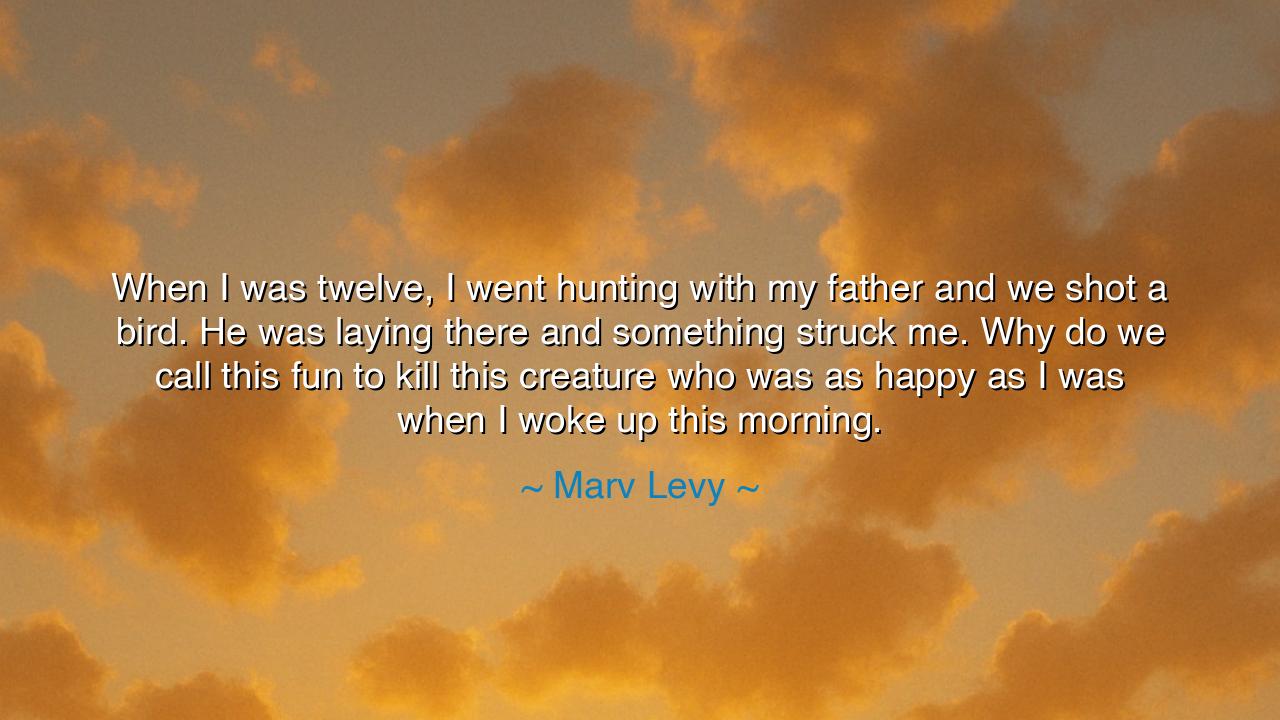
When I was twelve, I went hunting with my father and we shot a
When I was twelve, I went hunting with my father and we shot a bird. He was laying there and something struck me. Why do we call this fun to kill this creature who was as happy as I was when I woke up this morning.






Hear now the voice of Marv Levy, a man of discipline and vision, who once confessed with trembling honesty: “When I was twelve, I went hunting with my father and we shot a bird. He was laying there and something struck me. Why do we call this fun to kill this creature who was as happy as I was when I woke up this morning.” In these words lies not only the memory of a boy, but the awakening of a conscience. For in the still body of that bird, he saw reflected the mystery of life itself, and the folly of calling destruction a joy.
The meaning of his revelation is profound. Too often mankind clothes violence with the garments of sport, forgetting that every creature, whether bird, beast, or man, rises each morning with the same desire—to live, to breathe, to rejoice in the gift of another dawn. Levy, young though he was, felt the strike of truth upon his soul: that the bird’s life was no less sacred than his own laughter at sunrise. In that instant, he understood that fun at the expense of life is no true joy, but a theft from the harmony of creation.
The origin of this wisdom is ancient, for long before modern times, sages taught reverence for all that breathes. In the East, the teachings of the Buddha declared compassion for all living beings, seeing the bond that unites man with animal. Among the Greeks, Pythagoras urged his followers to refrain from cruelty, proclaiming that souls are kin across species. In Levy’s youthful sorrow, this same current of ancient wisdom stirred, reminding us that empathy awakens when we dare to see through the eyes of another—even a creature with wings.
Let us recall the tale of Saint Francis of Assisi, who walked the forests of Italy speaking to the birds and blessing the beasts of the field. He saw in them not dumb animals, but companions in the great song of life. Where others saw mere prey, Francis saw joy and kinship. And so it is with Levy’s story: the dead bird was not just a trophy, but a silenced singer of the morning, a reminder that to kill without need is to dishonor the very wonder of existence.
The lesson is not only about hunting, but about how we treat all life around us. Do we crush the fragile for our amusement? Do we ignore the silent cries of those weaker than us, whether man or creature? Levy’s awakening calls us to live with gentleness, to recognize that life mirrors life, and that what we extinguish thoughtlessly may once have shared in our same joy.
Practical actions rise from this truth. Live with compassion. Before acting, ask yourself: Does this bring life or diminish it? Show kindness to animals, for they too know fear and happiness. Show respect to strangers, for they too rise each day hoping for peace. Choose hobbies and pleasures that build rather than destroy, that heal rather than wound. In so doing, you will find deeper joy, a joy not built upon suffering, but upon harmony.
And so, child of tomorrow, take this story to heart. The bird that lay in silence spoke louder than any teacher, reminding Marv Levy—and through him, us—that life is sacred wherever it beats. Let your hands be those that lift, not those that break. Let your laughter be that which joins the chorus of creation, not the silence that follows after a shot. For the truest fun, the noblest joy, is not in taking life, but in cherishing it.






AAdministratorAdministrator
Welcome, honored guests. Please leave a comment, we will respond soon